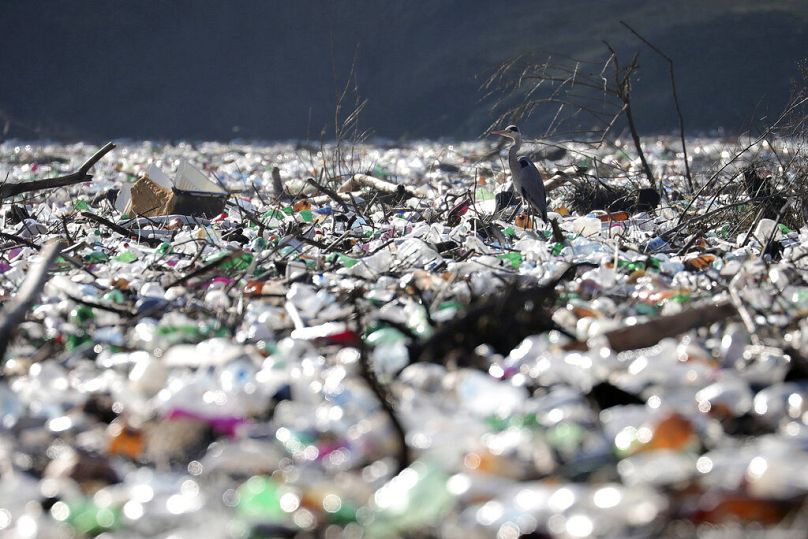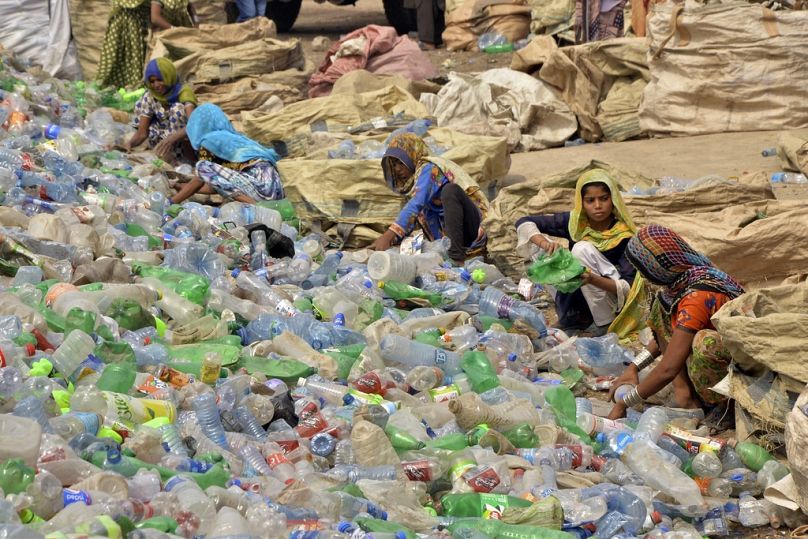We are stuck in a cycle of single-use plastic dependency. We can no longer ignore the facts, and we can no longer afford to resist the change, Sarah Perreard writes.
The simple idea of pinpointing an annual date when humans can no longer properly manage plastic waste was first marked in 2023. Plastic Overshoot Day provided a moment to reflect upon the challenge laid before us.
Since the launch of last year’s report and overshoot day, we have had INC2 negotiations in Paris; INC3 in Nairobi, and the published drafts of a Global Plastic Treaty that many hope can be the vehicle for change.
But despite these steps forward, it often seems that we are stuck in a cycle of single-use plastic dependency.
Whilst policy has been mooted, schemes devised and initiatives launched, plastic has continued to rise, and our planet and its people have sat under an ever-darkening cloud of pollution that showers its toxic consequences upon us.
We live in a world of misplaced illusions
The findings of this year’s Plastic Overshoot Day report are eerily similar to that of 2023. This year's global Overshoot Day falls on 5 September, one day later than 2023 when using our revised scope which includes textiles and household waste. But this isn’t cause for celebration.
A staggering 220 million tonnes of plastic waste will still be generated in 2024, another milestone representing a 7.11% surge in plastic waste levels since 2021. On average, each person contributes a shocking 28kg globally.
In 2024, there are four whole months where the world is producing more plastic waste than we can cope with; plastic destined to pollute our environment and our bodies.
In total, nearly 70 million tonnes of plastic are expected to be mismanaged globally. Close to 50% of the world’s population currently live in areas where waste generated has already exceeded the capacity to manage it, with the figure projected to rise to 66% by 5 September.
Whilst this cycle of degradation remains, illusions of lasting progress made so far are misplaced.
The good, the bad, and the grim
Countries have varying capacities to effectively manage the plastic waste they generate, and the tools to break the cycle of plastic overshoot are nuanced and state-dependent.
What works for some may not work for others. The fundamentals for change, however, are inescapable.
We cannot simply throw money at the problem and walk away; arguably the modus operandi of the traditional model of waste management investment to date. Instead, outcome-based financial mechanisms, where success is measured by outcome and not purely return on investment, must be embraced by both business and government.
This supports local, small-scale and “upstream” solutions that often struggle to access institutional funding, as traditional financing sources rely on track records, return on investment, and demonstration of scalability.
The World Bank’s $100 million (€93.1m) plastic bond is a positive first in this new form of investment and one that is particularly beneficial to a Global South that struggles under the weight of the world’s plastic exports.
This form of investment is one aspect of the change needed; scaling waste management is another. But without a fundamental shift in perceptions around our understanding of circularity, we are doomed to experience a continual rise in pollution.
We can't keep bottling it
We must ultimately look forward and reimagine the way in which we consume.
The adoption of re-use models is taking an increasing hold, alternatives to plastic also, but both should not be seen as a marketing gimmick, but as core principles for business.
Despite the best efforts of states and industry to recycle our way out of this crisis, single-use consumption is the fuel that locks us into the cycle of plastic overshoot.
Transparency is an element central to this shift and one that can be fostered through the adoption of plastic footprinting; a process of evaluating the effect that the plastic generated by an individual, organisation, community, or country has on the environment.
The mandatory adoption of this functional methodology as part of a future UN Treaty would allow for a better understanding of how the employment of plastic impacts the environment and humankind alike.
From there, we have the foundation to replace the tried, tested and tired models of consumption that have got us into this mess.
The UN Global Plastics Treaty represents the greatest opportunity to date for such fast-tracked global change.
With the fourth round of negotiations in Ottawa at the end of this month, we can no longer ignore the facts, we can no longer afford to resist the change that should be set in motion through the treaty.
Sarah Perreard is the Co-CEO of EA Earth Action.
At Euronews, we believe all views matter. Contact us at view@euronews.com to send pitches or submissions and be part of the conversation.













